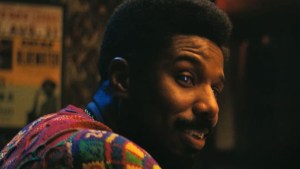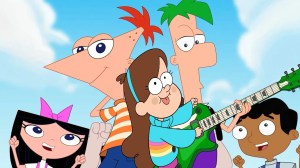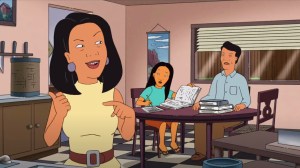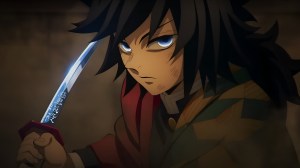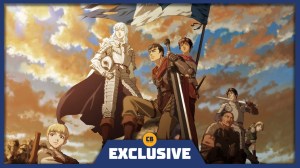
Last week, forty years to the day after their journey began, the husband-wife creative team of Wendy and Richard Pini attended a signing at Things From Another World in Portland, to say goodbye to Elfquest.
Videos by ComicBook.com
The legendary creator-owned series drew to a close last week, and the Pinis are taking some time away from deadlines to hit the streets and meet fans of the indie comics mainstay.
Wendy and Richard Pini joined ComicBook.com to discuss last week’s conclusion, and the history of Elfquest over its forty-year existence.
ElfQuest is a thing that existed before the direct market as we know it. I guess a good way to start is do you have any advice for younger cartoonists who are trying to survive in this kind of incredibly inhospitable industry?
Wendy Pini: Well, you have to remember that we started in a different era. The conditions were very different then.
Richard Pini: The direct market did exist, but it was brand-new. And there was no digital. There was no internet. There was nothing but word of mouth and printed paper. And when we started ElfQuest, there was Marvel and DC and Archie and not much else, so we had a wide-open playing field before us that we filled a vacuum that we didn’t even know had existed.
Now, of course, there are hundreds if not thousands of talented people hopeful, putting their ideas in digital form, putting them out on their websites or in blogs or however they’re doing it. And the difference is that you have a much easier time of it because you don’t have to pay a printer or do any of that stuff, but at the same time, the competition is insane.
WP: Yes, there’s a saying in the industry now that anybody can get their first issue out. Getting your second one out and developing a following for it is just tremendously competitive right now.
The advice that we could give a young person wanting to get into the business right now can’t really be based on our personal experience from the past because those conditions are gone and will never come back. This is the age of the World Wide Web, and you really, really have to be digital savvy now.
RP: Underlying that, just to wrap this up, you have to have a story. You have to be willing to put that out there however you measure it, issue after issue after issue, or strip after strip. You have to be committed to the long term, because there are so many people doing the same thing. You have to show that you are willing to give your time, talent, and heart and love into your project, and that will come through in the work. That is what will build your base.
Is it almost a bit traumatic to say goodbye to these characters after forty years?
WP: No, not a trauma at all, because you see, the plot line for Final Quest in particular, which took us five years to tell, had been worked out back in the mid-90s. Actually, the detailed treatment for it was written over 20 years ago.
So, one of the challenges of doing Final Quest was to keep the material fresh and keep the artwork and the writing in the moment, because we knew exactly where the story was going and how it would end.
RP: The emotions are probably more of…you know, if you have kids that they’re going to grow up, and they’re going to go off to college, and then they’re going to maybe go off into lives of their own. And they’re your children, so it shouldn’t be traumatic when they do that, but you will certainly have very strong feelings of letting go, of wistfulness, of longing, of celebration on the other side. But this is no shock. This is no surprise. This has been known, and now we’re taking the year to feel it.
Is it gratifying to get away from deadlines for a while and get face to face with fans again?
RP: You’ve heard horror tales from some professionals about how rude some fans, a very small fraction of the fandom , can be. We have never experienced that. By and large, people who love ElfQuest just love it unconditionally. They may get very emotional, and we’ve dealt with that. But that’s a happy thing to have to deal with.
WP: Yeah, and that’s the thing, when we do get to meet our fans, very often we have to deal with tears because they want to express to us how much they love the characters, how much the story has meant to them.
And in some cases, a fan will tell us that something as extreme as, “This ElfQuest kept me from committing suicide.” And when you hear something like that, you realize that the work you’re doing is touching lives that you never even knew were out there.
So being able to get out there and meet with the fans and give love and receive love, it is very gratifying, and we really do love that.
When you look at the last issue, without spoiling anything, you spend about half of the issue in a kind of reactive mode. Like, a lot of the “plot” happens at the beginning, and then there’s a lot of character in the back half.
RP: Having been witness to the last, I would say, eight to 10 issues, all of which … I mean, the whole thing leads up to this, but when I get the chance to stand back and watch Wendy work, she has one of the most exquisite senses of timing and pacing within a given page count that I have ever seen.
And we had plenty of discussions, “All right, how much should we give to this event in this issue? How many pages or panels?” And I could just see the wheels turning in her head about, “All right, we’ve got this much more to go. We’ve got this many pages. How can this best be done?” And it’s an amazing process to witness.
She would go through these crises of confidence with each issue and would worry that, “Oh, my God, I left that out,” or “I didn’t give enough stage time to this over here.” And I would be reading this over her shoulder as she’s drawing, and I’m saying, “You’re doing it perfectly. I’m sobbing my eyes out, here. Stop worrying.” And she’d say, “No, no, no.”
And of course, the issue would come out, and the response would be 100% positive. It’s an amazing thing to watch, and she does it as good as the best and better than most.
Modern coloring techniques obviously make the book look a bit different than it did 40 years ago when everything was wildly different, technologically. But obviously, this is a book that has really done a very good job of adjusting to that technology and retaining the look and feel of the same world. How much consideration does that require?
WP: Well, a tremendous amount of credit has to go to my colorist, Sonny Strait.
Sonny, who in his own right is a famous voice person for anime and cartoons, kind of grew up reading ElfQuest . He sort of developed his inking technique as a cartoonist from reading ElfQuest . We met at San Diego Comic-Con, and he asked to become my apprentice.
And I took him on immediately, number one, because I was a fan of his, and number two, he could draw the characters on-model. And as we worked together, he began to learn Photoshop and learn how to do coloring digitally. So, Sonny was the ideal choice for coloring The Final Quest because his sensibilities about ElfQuest are old-school, so he brought that old-school feeling of how the characters should be colored and lit and shaded and how magic should be depicted and all those things. And that’s why I think you’re feeling a consistency between ElfQuest in the past and ElfQuest of today.
RP: Another side to that answer, however, is that Wendy has often said she has been working with pen and ink and watercolor and acrylic and all of that kind of stuff for all of her life … and she’s a master at it, but she has often said that what she really, really wanted to do all the time was to paint with light.
When you paint with paint, you’re not doing that; it’s pigment on paper. But when you are looking at a computer monitor, you are literally painting with light. So when Photoshop came along, she finally had the opportunity to bust loose and actually paint with light, and that has informed everything since … oh, I would say probably the mid- to late 1990s.
But it’s the same artistic spirit, the same style underlying whatever the medium is. And there’s another reason for the intense consistency.
It has been decades that you have had an ending in mind. Has there ever been a temptation to change it?
WP: Not the ending, but…our best example is Winnowill . We thought Winnowill was going to be maybe just a background sort of character, a walk-on.
We had no idea she was going to become a major villain and a major motivating force through the entire story to the very end. So sometimes a character will surprise you if you think it has less potential than it turns out having, and Winnowill is a perfect example of that.
And she did help to expand the story and take it in a different direction. So from time to time, we encountered plot lines and scenarios that have deserved more going into than we originally thought. So they have taken the story other directions, which has just served to make it richer and more interesting. We always love when that happens.
RP: The basic skeleton of ElfQuest has always been there, and ElfQuest has basically always been kind of a metaphoric autobiography for the two of us. But when you go through life, things happen that you don’t foresee. The course of your life can change a little or it can change a lot. It’s still your life. You’re not making anything radically different, but you do adapt.
You do flex and give something more or less attention according to how you feel it should be handled, and that’s exactly how we have handled ElfQuest for 40 years. The structure has always been there. You go into the fine detail, well, maybe this character was wearing blue in the original conception and he’s wearing green now. Big deal.
It’s been a decade since Terry Moore closed up shop on Strangers in Paradise, and now he’s back. Would you guys ever consider a reunion tour?
WP: No, you have met few couples who are more completely in sympathy and in-tune about having no more deadlines in their lives for the rest of their lives.
RP: Anybody who wants to talk to us about the process, we love to talk about it. We will go into it in great depth, and we will be very, very honest. And it probably won’t be what they’re expecting to hear, but hey, we’ve been here longer than many. We had no idea we might still be here after 40 years doing it this way, wrapping it up this way as satisfyingly as we’re doing it.
WP: I will jump in say, though, that if I knew I was going to be drawing these blankety-blank elves for 40 years, I would have designed them quite differently. They all would have been bald and naked.
You can get Elfquest: The Final Quest #24 in stores now and online.


